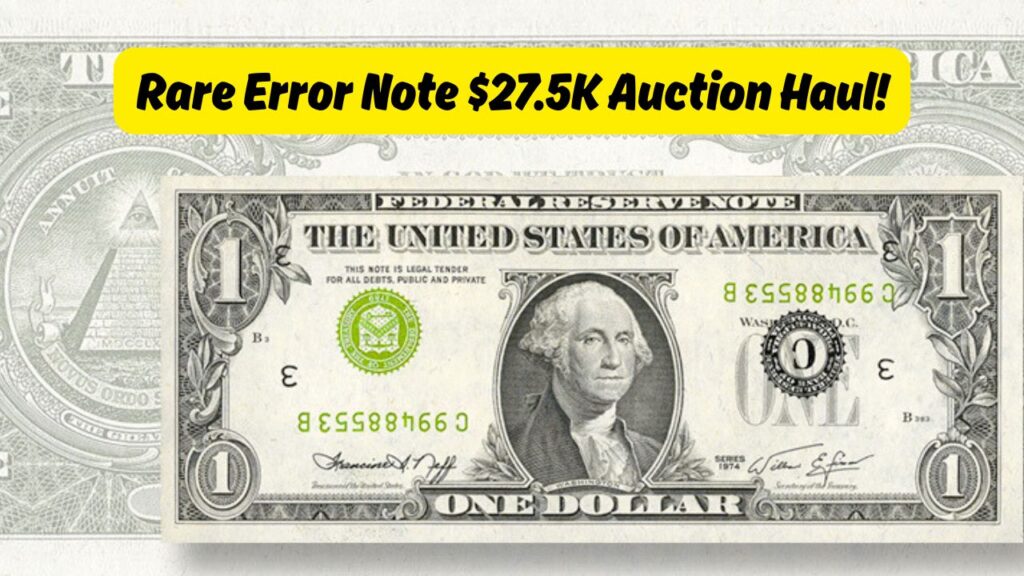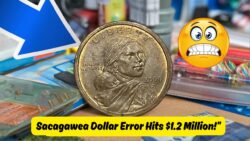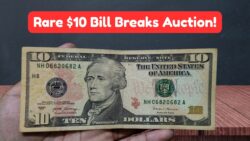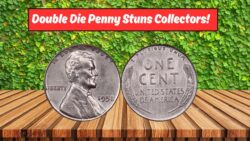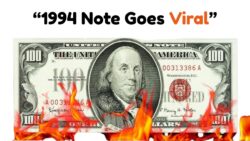$1 Bill – In a stunning turn of events that has set the currency-collecting world abuzz, a rare $1 bill with a dramatic printing error recently sold at auction for an astounding $27,500. This unique piece of U.S. currency, known as an “inverted overprint error” note, has captured the fascination of collectors and experts alike. While it may seem unbelievable that such a small mistake could command such a high price, the story behind this bill proves why error notes have become a hot commodity in the numismatic market.
What Is an Upside Down Print Error Note?
A $1 bill with an upside-down print, often referred to as an “inverted overprint,” is a type of printing mistake where critical design elements like the serial number, Treasury seal, and Federal Reserve seal are printed upside-down relative to the main design. This error occurs when the sheet is fed incorrectly during one of the final printing stages at the Bureau of Engraving and Printing (BEP).
Why These Errors Are So Rare
- Printing errors at the BEP are uncommon due to strict quality control.
- Inverted overprints are often caught before bills are released into circulation.
- Only a handful of such notes have made it into public hands, increasing their rarity and value.
- The chance of finding such a note in everyday change is extremely low.
Auction Highlights – How This $1 Bill Reached $27,500
The recent auction, held by a reputable numismatic house, featured this $1 bill as one of its spotlight items. The note, dated from the 1980s series, was in nearly uncirculated condition with a crisp structure and visible details.
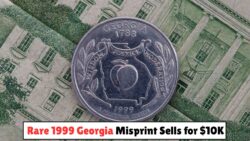 This 1999 Georgia Quarter With Misprint Just Hit $10,000 at Auction – Still in Circulation!
This 1999 Georgia Quarter With Misprint Just Hit $10,000 at Auction – Still in Circulation!
Key Auction Details:
| Feature | Description |
|---|---|
| Note Type | $1 Federal Reserve Note |
| Error Type | Inverted Overprint (Upside Down Print) |
| Series Year | 1985 |
| Auction House | Heritage Auctions |
| Final Sale Price | $27,500 |
| Condition | Almost Uncirculated |
| Collector Interest | Extremely High |
Why Do Collectors Pay So Much?
For many, the appeal lies in the story and rarity of the piece. Currency errors symbolize a momentary lapse in one of the world’s most secure and controlled printing systems.
Factors That Drive Value:
- Rarity: Few examples exist with such errors.
- Condition: The better the condition, the higher the price.
- Public Attention: Headlines like this draw more bidders and raise the price.
- Certification: Graded and authenticated notes get better auction results.
How to Identify a Real Upside-Down Print Error
If you believe you might have an error note, there are specific signs to look for:
Look Out For:
- The serial number printed upside-down compared to the main bill.
- Treasury or Federal Reserve seal flipped.
- Sharp edges, meaning the note hasn’t been tampered with.
- Consistency between front and back alignment (errors should only affect one side).
What Not to Mistake as Errors:
- Off-center prints (common and less valuable).
- Folds or tears misinterpreted as print flaws.
- Fake “novelty” bills made for tricks or souvenirs.
Other Famous Currency Errors That Sold Big
This recent $1 bill isn’t the only banknote that fetched a huge price due to an error. Here’s a look at other jaw-dropping auction records:
| Note Description | Sale Price | Error Type |
|---|---|---|
| 1977 $1 Inverted Overprint | $25,300 | Serial & Seal Upside Down |
| 1988A $20 Misaligned Print | $15,000 | Double Print Offset |
| 1995 $10 “Butterfly Fold” Error | $13,800 | Folded Before Overprint |
| 2006 $100 Bill Without Security Thread | $9,400 | Missing Features |
| 1981 $5 With Blank Back | $7,200 | One-Sided Print |
What Should You Do If You Find One?
If you ever come across a bill that seems to have a print error:
Follow These Steps:
- Do Not Spend It – Even if it’s just a $1 bill, it could be worth thousands.
- Preserve It – Place it in a protective plastic currency sleeve.
- Get It Graded – Use companies like PCGS Currency or PMG.
- Research – Look for similar notes online.
- Consider Auctioning – Reach out to heritage or currency auction houses.
Finding a printing error on a $1 bill may seem like winning a lottery. While these occurrences are rare, they prove that even the smallest denominations can hold incredible value under the right circumstances. If you’re someone who frequently checks their change—or even keeps older bills stashed away—you might just be sitting on a small fortune. So, next time you’re handed a $1 bill, don’t be so quick to stuff it in your wallet. A slight mistake could mean a major payday.
FAQs
Q1. What exactly is an inverted overprint error on a $1 bill?
A: It’s when the serial numbers and Treasury seal are printed upside-down relative to the main bill design.
Q2. Are such $1 bills still in circulation today?
A: Very few. Most are found and kept by collectors, but some rare ones may still surface.
Q3. Can any banknote with a defect be worth thousands?
A: No, only specific errors like inverted overprints, missing prints, or misalignments are highly valuable.
Q4. How do I get a potential error note authenticated?
A: Submit it to professional grading services like PMG (Paper Money Guaranty) or PCGS Currency.
Q5. Can I sell an error note without going to an auction house?
A: Yes, but reputable auction houses usually fetch better prices due to competitive bidding and authentication.

